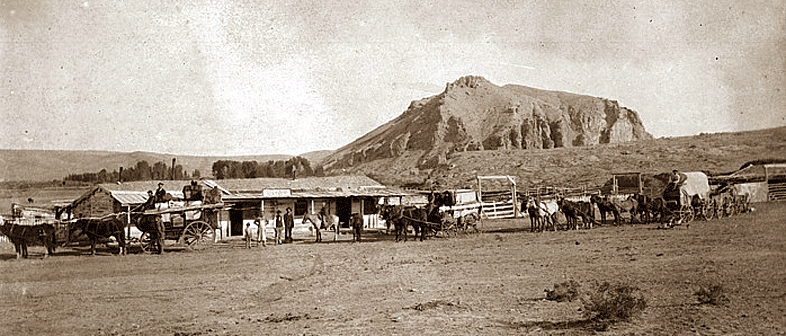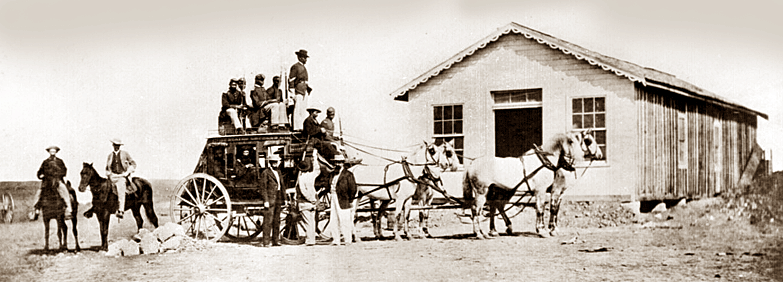|
The
best preserved station on the Overland Trail is at Point of Rocks, Wyoming,
where the Overland Trail passed between two rocky ridges along Bitter Creek.
It was referred to as Rock Point and on early maps as Alwood Station. Wells
Fargo called it Point of Rocks, named for the sandstone ledges rising above
it like flying buttresses. From here I had sweeping views, east over pastel
buttes into the sheep country of the Great Divide Basin, and north to the
White Wine River over Steamboat Mountain and the Lucite Hills. Both the
Overland and Oregon Trails, as well as a north-south freight road
intersected here.

Twain described his visit there in 1886, as always,
with a bit of satire, "The rock chairs and sofas were not present...but
they were represented by two to three-legged stools, a four-foot pineboard
bench and two empty candle boxes. The table was a greasy board on stilts, a
battered tin platter, a knife and fork and a tin pint cup were at each man's
place..."
"In place of a window there was a square hole
about large enough for a man to crawl through but without glass," Twain
added. "There was no flooring, but the ground was packed hard. There
was no stove, but the fireplace served all purposes. There were also no
shelves, no cupboards, and no closets. In a corner stood an open sack of
flour, and nestling against its base were a couple of black tin coffeepots.
A tin teapot, a little bag of salt, and a side of bacon.
"By the door of the station-keeper's hut outside
was a tin washbasin, on the ground. Near it was a pail of water and a piece
of yellow bar soap, and from the eaves hung a hoary blue woolen shirt, the
stationkeeper's private towel--only two persons in the party were allowed to
use it--the stage-driver and conductor. We washed and dried with our sleeves
and hankerchiefs. If passengers were lucky, there might be some sort of
mirror but usually not."

I could only imagine the colorful, but rough stationmen
dressed in their dull blue and yellow coarse-woven pantaloons and buckskins,
their pants stuffed into the tops of high boots, heels armed with great
Spanish spurs, whose little iron clogs and chains jingled with every step.
An old slouch hat and long revolver slung through his belt would have
completed the portrait.
Twain recounted his breakfast at Point of Rocks, "The
stationkeeper up-ended a disk of last week's bread, of the shape and size of
an old-time cheese, and carved some slabs from it. He sliced off a piece of
bacon for each man, but only the experienced old hands made out to eat it,
for it was condemned Army bacon which the US would not feed its soldiers and
the stage company had bought it cheap to feed their passengers and
employees.
"He poured a beverage called `Slumgullion' which
really pretended to be tea, but there was too much sand, old bacon rinds and
too much dish-rag to deceive the intelligent traveler. An old broken vinegar
cruet with a dozen preserved flies with their heels up in it. We had all
this for a $1 each."
Next: The Wild West And
Home
|
